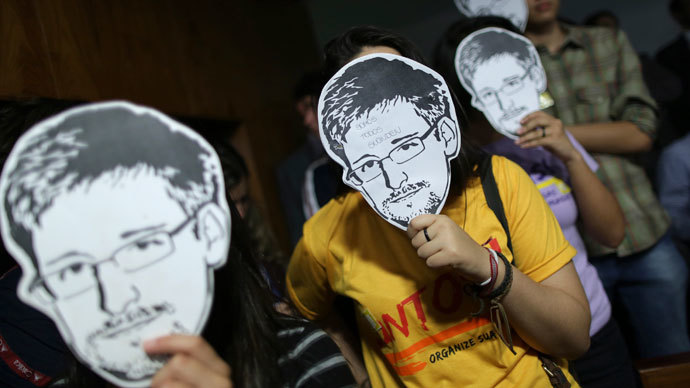What was missing from MI5 chief Andrew Parker's speech

Sir Andrew Parker, the recently elevated Director General of the UK's domestic security Service (MI5) yesterday made both his first public speech and a superficially robust defense of the work of the intelligence agencies.
Reading from the outside, it sounds all patriotic and noble. And who is
to say that Parker does not believe this after 30 years on the
inside and the MI5 groupthink mentality being what it is? Let's
give him the benefit of the doubt.
However, I have two problems with his speech, on both a micro and
a macro scale. Let's start with the micro – i.e. the devil in the
detail - what is said and, crucially, what is left unsaid. First
up: oversight, which the spook apologists have dwelt on at great
length over the last few months.
I wrote about this last week, but here's some
of that devilish detail. Parker correctly explains what the
mechanisms are for oversight within MI5: the Home Office warrants
for otherwise illegal activities such as bugging; the oversight
commissioners; the Complaints Tribunal; the Intelligence and
Security Committee in Parliament.
This all sounds pretty reasonable for a democracy, right? Of
course, what he neglects to mention is how these systems can be
gamed by the spies. The application for warrants is a tick-box
exercise where basic legal requirements can be by-passed, the
authorizing minister only ever sees a summary of a summary.... ad
infinitum.... for signature, and never declines a request in case
something literally blows up further down the line.
Sure, there are independent commissioners who oversee MI5 and its
surveillance work every year and write a report. But as I
have written before, they are given the royal
treatment during their annual visit to Thames House, and officers
with concerns about the abuse of the warrant system are barred
from meeting them. Plus, even these anodyne reports can highlight
an alarming number of "administrative errors" made by the
spies, no doubt entirely without malice.
The complaints tribunal - the body to which we
can make a complaint if we feel we have been unnecessarily spied
on - has always found in favor of the spies. And finally, the
piece de resistance, so to speak: the Intelligence and Security
Committee in parliament. How many times do I have to write this?
Top cops and Parker's spy predecessors have admitted to lying successfully to the ISC for many years. This is not meaningful oversight, nor is the fact that the evidence of earlier major intelligence whistleblowers was ignored by the ISC, except for the part where they might be under investigation by MI5 themselves.

Of course, the current Chair of the ISC, Sir Malcom Rifkind, has
entered the lists this summer to say that the ISC has just
acquired new powers and can now go into the
spies' lairs, demand to see papers, and oversee operational
activities. This is indeed good, if belated, news, but from a man who has
already cleared GCHQ's endemic data-mining as
lawful, one has to wonder how thorough he will be.
While the committee remains chosen by the PM, answerable only to
the PM, who can also vet the findings, this committee is
irredeemably undemocratic. It will remain full of credulous
yes-men only too happy to support the status quo. Secondly, what
are the threats that Parker talks about? He has worked for MI5
for 30 years and will therefore remember not only the Cold War
era, where Soviet spies were hunted down, but also the very real
and pervasive threat of IRA bombs regularly exploding on UK
streets.
At the same time hundreds of thousands of politically active UK citizens were aggressively investigated. A (cold) war and the threat of terrorism allowed the spies a drag-net of surveillance even then. How much worse now, in this hyper-connected, data-mining era?
One chilling phrase that leapt out at me from Parker's speech was the need to investigate "terrorists and others threatening national security."
National security has never been legally defined for the purposes
of UK law, and we see the goal posts move again and again. In the
1980s, when Parker joined MI5, it was the ‘reds under the
bed’, the so-called subversives. Now it can be the Occupy group encamped in the City of London or
environmental activists waving placards.
So now for my macro concerns, which are about wider concepts.
Parker used his first public speech to defend not only the work
of his own organization, but also to attack the whistleblowing
efforts of Edward Snowden and the coverage in The Guardian
newspaper. He attempts to seamlessly elide the work and the
oversight models of MI5 and GCHQ.
And who is falling for this? Well, much of the UK media apparently. This muddies the waters. The
concerns about Snowden's disclosures are global - the TEMPORA project affects not only the citizens
of the UK but people across Europe and beyond. For Rifkind or the
Foreign Secretary to complacently say that GCHQ is overseen by
them and everything is hunky-dory is just not good enough, even
for the hapless citizens of the UK.
How much more so for those unrepresented people across the world?
The IOCA (1985) and later and much-abused RIPA (2000) laws were written
before the UK government could have conceived of the sheer scale
of the internet. They are way out of date - 20th century rolling
omnibus warrants hoovering up every scrap of data and being
stored for unknown times in case you might commit a (thought?)
crime in the future.
This is nothing like meaningful oversight. Unlike the UK, even
the USA is currently having congressional hearings and media debates
about the limits of the electronic surveillance program.
Considering America's muscular response after 9/11, with illegal
invasions, drone strikes, CIA kill lists and extraordinary
kidnappings (to this day), that casts the UK spy
complacency in a particularly unflattering light.
Plus if 58,000 GCHQ documents have really been copied by a young
NSA contractor, why are Parker and Rifkind not asking difficult
questions of the American administration, rather than continuing
to justify the antiquated British oversight system?
Finally, Parker is showing his age as well as his profession when
he talks about the interwebs and all the implications. As I said
during my statement to the LIBE committee in the European
Parliament:
• Without free media, where we can all read, write, listen and discuss ideas freely and in privacy, we are all living in an Orwellian dystopia, and we are all potentially at risk. These media must be based on technologies that empower individual citizens, not corporations or foreign governments. The Free Software Foundation has been making these recommendations for over two decades.
• The central societal function of privacy is to create the space
for citizens to resist the violation of their rights by
governments and corporations. Privacy is the last line of defense
historically against the most potentially dangerous organization
that exists: the nation state. Therefore there is no ‘balance
between privacy and security’ and this false dichotomy should not
be part of any policy debate.
The statements, views and opinions expressed in this column are solely those of the author and do not necessarily represent those of RT.
The statements, views and opinions expressed in this column are solely those of the author and do not necessarily represent those of RT.













